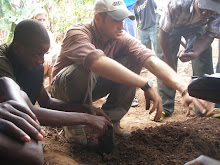Devin Rippner my site-mate from Vwaza started the day off right with a very professional theoretical session on sustainable agriculture. Devin looking very dapper in his suit jacket and tie talked to the students about the value of good soil, and the benefits of maintaining its fertility and structure by adding compost and inter cropping nitrogen fixing trees. He talked a lot about the economics of conservation farming, and how they could save money by using compost and rotating a variety of crops instead of fertilizer and other inputs to grow just one crop.
After Devin's inspiring lecture the students visited a near-by lead farmer named Fredrick Msiska so they could see conservation farming in action. Mr. Msiska practices a wide variety of sustainable farming techniques in his fields and the students got some hands on experience as he invited them to help him mark the contour lines of a field using an A-frame with a line level across its top. They also got to make Bocash compost a Chinese method where they mix chopped maize husks, soil, wood ash, yeast, and water for fast decompisition in only about 21 days.
Mr. Msiska also showed us his demonstration plots where he mulches like a mad-man, intercrops nitrogen fixing trees and marks all of his boundaries with money making trees, like coffee or macadamia. He also showed the students his two chamber composting toilet which allows one side to decompose for 1 year while he is using the other side, when that side fills he clears out the decomposed chamber and starts using that side again. He also showed the students his liquid manure made by soaking chicken manure in water for 21 days, then dilutes the resulting tea with fresh water 20-1. He then uses that as a nitrogen rich top dressing for maize and tomatoes. It was really great for the students to see a Malawian who doesn't let anything go to waste on his farm, hopefully they take back some of these ideas to try and use in their own homes.
The afternoon was all about fish farming, and was mostly lead by Mr. Masukwa the Nchena chena fisheries extension officer. He started out by giving the students a long and detailed theoretical session that explained how to select a site for a pond, dig it, lime it, manure it, and stock it. He also talked about different types of fish as well as diseases that might become a problem.
After Masukwa's talk we went down to he research center's ponds to see the real thing. These ponds were first dug by the British in the 1950s and they are still very impressive today. There are over 20 ponds, the largest one is about the size of a football field, while the smallest one is about 5x10 meters. The ponds have a constant flow of water into their main inlet canal that allows water into each individual pond through a floodgate called a monk. Each pond also has angle jointed pipes that act as an overspill outlet, or can be turned down to drain the pond completely into the outlet canal. All of the ponds are stocked with talapia. The students were mostly impressed with the sheer size of the operation, the ones who were most serious about fish farming went back to the classroom afterwards and watched my compass II fish farming videos until dinner was ready.
After dinner our Ambassador of Fun Al organized a version of the game “Mafia” with a wildlife twist on it. He called it “Poacher Mob,” the Mafia were replaced by poachers, the sheriff was replaced by a forest guard, the doctor a traditional medicine man, and the citizens were different animals and trees of Nyika. I was amazed how fast the students picked it up, in no time they were tossing back and forth accusations and frantically trying to defend their innocence, “ I couldn't have killed the zebra he's my friend, and besides Moses is the real poacher.” The teachers only lasted a few rounds before Alinon turned the role of God over to Elijah Chipeta one of our outstanding and most gregarious youth councilors. I woke up a few hours later to go to the bathroom and still heard accusations flying in the classroom, “You killed the Msangu sangu tree! I can see it on your face!”

No comments:
Post a Comment